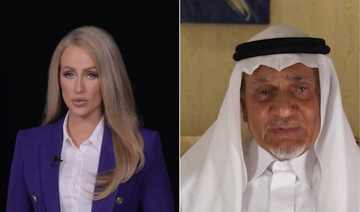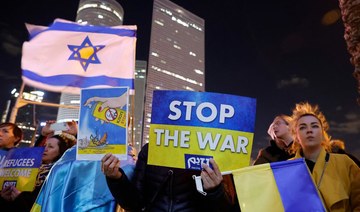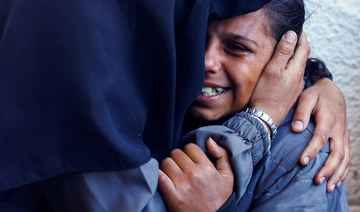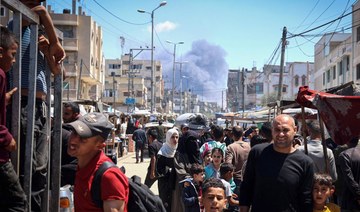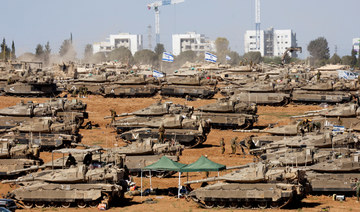TEL AVIV: Israel on Monday lashed out at Russia over “unforgivable” comments by its foreign minister about Nazism and antisemitism — including claims that Adolf Hitler was Jewish. Israel, which summoned the Russian ambassador in response, said the remarks blamed Jews for their own murder in the Holocaust.
It was a steep decline in the ties between the two countries at a time when Israel has sought to stake out a neutral position between Russia and Ukraine and remain in Russia’s good stead for its security needs in the Middle East.
Asked in an interview with an Italian news channel about Russian claims that it invaded Ukraine to “denazify” the country, Sergey Lavrov said that Ukraine could still have Nazi elements even if some figures, including the country’s president, were Jewish.
“Hitler also had Jewish origins, so it doesn’t mean anything,” he said, speaking to the station in Russian, dubbed over by an Italian translation.
In some of the harshest remarks since the start of the war in Ukraine, Israeli Foreign Minister Yair Lapid called Lavrov’s statement “unforgivable and scandalous and a horrible historical error.”
“The Jews did not murder themselves in the Holocaust,” Lapid said. “The lowest level of racism against Jews is to blame Jews themselves for antisemitism.”
Israel’s Holocaust memorial Yad Vashem called the remarks “absurd, delusional, dangerous and deserving of condemnation.”
“Lavrov is propagating the inversion of the Holocaust — turning the victims into the criminals on the basis of promoting a completely unfounded claim that Hitler was of Jewish descent,” it said in a statement.
“Equally serious is calling the Ukrainians in general, and President (Volodymyr) Zelensky in particular, Nazis. This, among other things, is a complete distortion of the history and an affront to the victims of Nazism.”
Nazism has featured prominently in Russia’s war aims and narrative as it fights in Ukraine. In his bid to legitimize the war to Russian citizens, President Vladimir Putin has portrayed the battle as a struggle against Nazis in Ukraine, even though the country has a democratically elected government and a Jewish president whose relatives were killed in the Holocaust.
Ukraine also condemned Lavrov’s remarks.
“By trying to rewrite history, Moscow is simply looking for arguments to justify the mass murders of Ukrainians,” Ukrainian presidential adviser Mykhailo Podolyak tweeted.
World War II, in which the Soviet Union lost an estimated 27 million people and helped defeat Nazi Germany, is a linchpin of Russia’s national identity. Repeatedly reaching for the historical narrative that places Russia as a savior against evil forces has helped the Kremlin rally Russians around the war.
For Israel, the Holocaust is central to its national ethos and it has positioned itself at the center of global efforts to remember the Holocaust and combat antisemitism.
But those aims sometimes clash with its other national interests. Russia has a military presence in neighboring Syria, and Israel, which carries out frequent strikes on enemy targets in the country, relies on Russia for security coordination there. That has forced Israel to tread lightly in its criticism of the war in Ukraine.
While it has sent humanitarian aid to Ukraine and expressed support for its people, Israel has been measured in its criticism of Russia and has not joined international sanctions against it. That paved the way for Prime Minister Naftali Bennett to be able to try to mediate between the sides, an effort which appears to have stalled as Israel deals with its own internal unrest.
The Holocaust and the constant manipulation of its history during the conflict has sparked outrage in Israel before.
In a speech to Israeli legislators in March, Zelensky compared Russia’s invasion of his country to the actions of Nazi Germany, accusing Putin of trying to carry out a “final solution” against Ukraine. The comparisons drew an angry condemnation from Yad Vashem, which said Zelensky was trivializing the Holocaust.
Israel lashes out at Russia over chief envoy’s Nazism remarks
https://arab.news/mvcha
Israel lashes out at Russia over chief envoy’s Nazism remarks

- Israel: ‘Unforgivable’ comments by Russian foreign minister Sergey Lavrov
- ‘Hitler also had Jewish origins, so it doesn’t mean anything’
Al-Azhar, Arab Parliament condemn Israeli incursion into Rafah
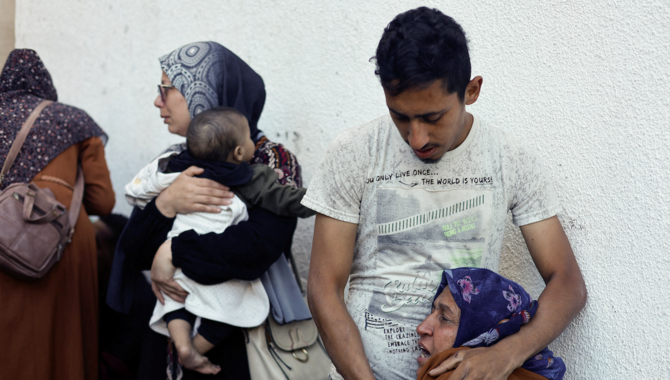
- Al-Azhar said the Israeli storming of the Rafah crossing was an attempt to invade the entire Palestinian city of Rafah and tighten the siege on the Gaza Strip
CAIRO: Al-Azhar Al-Sharif, Islam’s highest seat of learning, and the Arab Parliament have condemned in the strongest terms Israel’s actions in Rafah city in the Gaza Strip.
Israel on Tuesday sent tanks into Rafah in southern Gaza, seizing control of the border crossing with Egypt, an operation the UN said denied it access to the key humanitarian passage.
Al-Azhar said in a statement that the storming of the Rafah crossing by the tanks of the “terrorist Zionist entity” was an attempt to invade the entire Palestinian city of Rafah, tighten the siege on the Gaza Strip, and completely isolate it by shutting its last outlet to the outside world.
It called the Israeli action “a full-fledged war crime committed in full view of the entire world” and an addition to the series of “brutal crimes being committed by the occupying entity for more than 200 consecutive days.”
Al-Azhar said these “inhumane criminal attempts come within a series of recent escalations by the terrorist Zionist entity in the city of Rafah, which is the last refuge for Palestinian civilians.”
The institution said that this “portends the commission of new massacres and the fall of more innocent martyrs, in light of international silence and unprecedented impotence, which cannot be explained or justified.”
Al-Azhar said: “Our world is governed by a double standard and laws of the jungle, with the strong preying on the weak.”
It called on the international community, concerned international organizations, and all active parties to live up to their responsibilities in the face of the brutal massacres committed by the “Zionist entity” against Palestinians in Gaza, to intervene immediately to stop these “daily crimes” and to “make every effort to lift the siege on the strip completely and stop the Zionist plans.”
These plans, Al-Azhar said, aim at unscrupulously suffocating, starving and imprisoning 2 million innocent civilians, including women, children, the elderly, and the sick.
By capturing the Rafah crossing, Israel gained full control over the entry and exit of people and goods for the first time since it withdrew soldiers and settlers from Gaza in 2005, although it has long maintained a blockade of the coastal enclave in cooperation with Egypt.
The Arab Parliament, meanwhile, called Israel’s move “a dangerous escalation that undermines the efforts made to reach a ceasefire and spare the blood of Palestinian civilians who have been subjected to an unprecedented humanitarian catastrophe since the start of the brutal aggression against the Gaza Strip.”
It called the Israeli incursion “a death sentence for the wounded and sick in light of the collapse of the health system in the Gaza Strip.”
The Arab Parliament stressed that the developments taking place in the occupied Palestinian territories, including Rafah, and Israel’s intention to thwart efforts to reach a ceasefire are a clear embodiment of the “law of the jungle.”
It is, the organization said, a “blatant violation of all international norms, laws, and resolutions, which will lead the world into a dark tunnel and portend a new catastrophe that will end the remaining relief attempts and lead to complete genocide and forced displacement of millions of Palestinians.”
The Arab Parliament called on the international community, free countries, the UN Security Council, and the US administration to put more pressure than ever on the occupying entity to avoid further escalation and to force it to reach a sustainable truce and an immediate and permanent ceasefire.
The group praised the decision of the Bahamas to recognize the state of Palestine, stressing that it is “a new victory for the Palestinian cause and Palestinian diplomacy, especially since it comes at a time when the occupying entity’s plans to liquidate the Palestinian cause are exposed.”
South Gaza hospitals have only three days’ fuel left: WHO

- Despite international objections, Israel sent tanks into the overcrowded southern city of Rafah on Tuesday and seized the nearby crossing into Egypt
- “Hospitals in the south of Gaza only have three days of fuel left, which means services may soon come to a halt,” WHO chief said
GENEVA: Hospitals in the southern Gaza Strip have only three days of fuel left, the head of the World Health Organization said Wednesday, due to closed border crossings.
Despite international objections, Israel sent tanks into the overcrowded southern city of Rafah on Tuesday and seized the nearby crossing into Egypt that is the main conduit for aid into the besieged Palestinian territory.
“The closure of the border crossing continues to prevent the UN from bringing fuel. Without fuel all humanitarian operations will stop. Border closures are also impeding delivery of humanitarian aid into Gaza,” WHO Director General Tedros Adhanom Ghebreyesus said on X, formerly Twitter.
“Hospitals in the south of Gaza only have three days of fuel left, which means services may soon come to a halt.”
Tedros said Al-Najjar, one of the three hospitals in Rafah, was no longer functioning due to the ongoing hostilities in the vicinity and the military operation in Rafah.
“At a time when fragile humanitarian operations urgently require expansion, the Rafah military operation is further limiting our ability to reach thousands of people who have been living in dire conditions without adequate food, sanitation, health services and security,” he said.
“This must stop now.”
The Geneva-based WHO is the UN’s health agency.
Israel bombarded Rafah on Wednesday as talks resumed in Cairo aimed at agreeing the terms of a truce in the seven-month war.
Gaza’s bloodiest-ever war began following Hamas’s unprecedented October 7 attack on Israel that resulted in the deaths of more than 1,170 people, mostly civilians, according to an AFP tally of Israeli official figures.
Vowing to destroy Hamas, Israel has conducted a retaliatory offensive that has killed more than 34,800 people in Gaza, mostly women and children, according to the Hamas-run territory’s health ministry.
Egypt police probe murder of Israeli-Canadian businessman
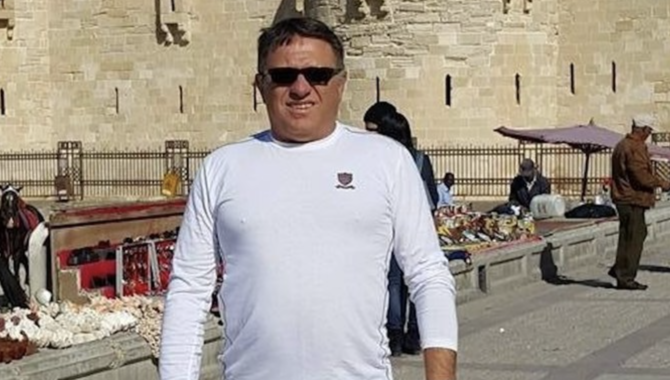
- Security sources made no link between the shooting and the dead man’s ethnic background
CAIRO: Egypt’s interior ministry said it had launched an investigation Wednesday after an Israeli-Canadian businessman was shot dead in the coastal city of Alexandria.
A police statement said the man, “a permanent resident of the country” was shot dead on Tuesday.
The Israeli foreign ministry said the murdered man was a businessman with dual Canadian-Israeli citizenship.
“He had a business in Egypt. The Israeli embassy in Cairo is in contact with the Egyptian authorities, who are investigating the circumstances of the case,” the ministry said.
Attacks on Israelis in Egypt are rare but not unprecedented.
On October 8, the day after Hamas attacked Israel triggering war in Gaza, an Egyptian policeman shot dead two Israeli tourists and their Egyptian guide.
Following their deaths, Israeli authorities advised its nationals in Egypt to leave “as soon as possible.”
Egypt was the first Arab country to sign a peace treaty with Israel but relations between the two peoples have never been warm.
The Egyptian government has often acted as mediator in flare-ups in the Israeli-Palestinian conflict that have threatened to stir up passions on the street.
Israel pounds Gaza as truce talks resume in Cairo
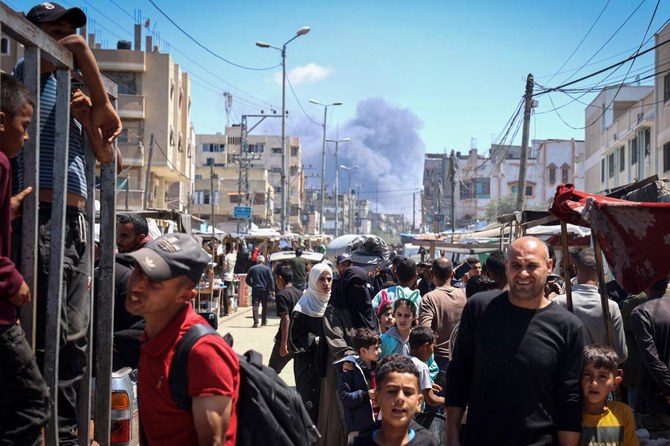
- AlQahera News: ‘Truce negotiations have resumed in Cairo today with all sides present’
- Moscow so far sees no prospect for a peace settlement in Gaza or the wider Middle East
RAFAH, Palestinian Territories: Israel bombarded the overcrowded Gaza city of Rafah, where it has launched a ground incursion, as talks resumed Wednesday in Cairo aimed at agreeing the terms of a truce in the seven-month war.
Despite international objections, Israel sent tanks into Rafah on Tuesday and seized the nearby crossing into Egypt that is the main conduit for aid into the besieged Palestinian territory.
The White House condemned the interruption to humanitarian deliveries, with a senior US official later revealing Washington had paused a shipment of bombs last week after Israel failed to address US concerns over its Rafah plans.
The Israeli military said hours later it was reopening another major aid crossing into Gaza, Kerem Shalom, as well as the Erez crossing.
But the UN agency for Palestinian refugees, UNRWA, said the Kerem Shalom crossing — which Israel shut after a rocket attack killed four soldiers on Sunday — remained closed.
It came after a night of heavy Israeli strikes and shelling across Gaza. AFPTV footage showed Palestinians scrambling in the dark to pull survivors, bloodied and caked in dust, out from under the rubble of a Rafah building.
Russia said on Wednesday that the war in Gaza was escalating due to Israel’s incursion into Rafah and that Moscow so far saw no prospect for a peace settlement in Gaza or the wider Middle East.
“An additional destabilizing factor, including for the entire region, was the launch of an Israeli military ground operation in Rafah,” Russian Foreign Ministry Spokeswoman Maria Zakharova told reporters.
“About one and a half million Palestinian civilians are concentrated there. In this regard, we demand strict compliance with the provisions of international humanitarian law.”
Speaking more broadly about efforts to find a lasting settlement in the Middle East, Zakharova said: “I would like to call it a settlement, but, alas, it is far from a settlement.”
“There are no prospects for resolving the situation in the Gaza Strip. On the contrary, the situation in the conflict zone is escalating daily.”
“We are living in Rafah in extreme fear and endless anxiety as the occupation army keeps firing artillery shells indiscriminately,” said Muhanad Ahmad Qishta, 29.
“Rafah is a witnessing a very large displacement, as places the Israeli army claims to be safe are also being bombed,” he said.
The Gaza war was sparked by Hamas’s unprecedented October 7 attack on Israel, which resulted in the deaths of more than 1,170 people, mostly civilians, according to an AFP tally of Israeli official figures.
Israel in response vowed to crush Hamas and launched a military offensive that has killed at least 34,789 people in Gaza, mostly women and children, according to the Hamas-run territory’s health ministry.
Militants also took around 250 people hostage, of whom Israel estimates 128 remain in Gaza, including 36 who are believed to be dead.
Talks aimed at agreeing a ceasefire resumed in Cairo on Wednesday “in the presence of all parties,” Egyptian media reported.
A senior Hamas official said the latest round of negotiations would be “decisive.”
“The resistance insists on the rightful demands of its people and will not give up any of our people’s rights,” he said on condition of anonymity because he was not authorized to speak publicly on the negotiations.
The official had previously warned it would be Israel’s “last chance” to free the scores of hostages still in militants’ hands.
Mediators have failed to broker a new truce since a week-long ceasefire in November saw 105 hostages freed, the Israelis among them in exchange for Palestinian prisoners held by Israel.
Mediator Qatar urges international community to prevent Rafah ‘genocide’
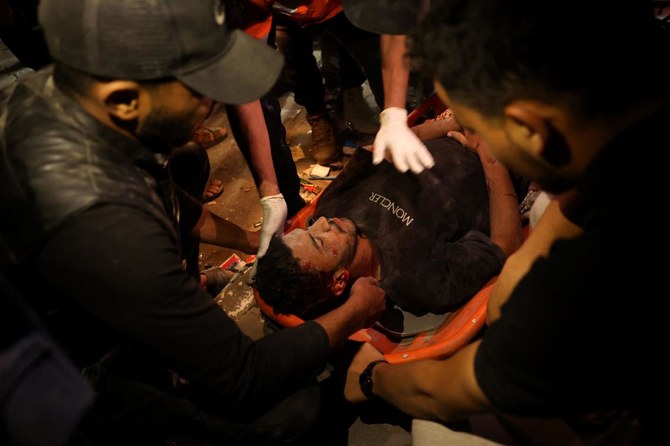
- Israel struck targets in the Gaza Strip on Wednesday after seizing the main border crossing with Egypt
- African Union condemns the Israeli military’s moves into southern Gaza’s Rafah
DOHA: Qatar called on the international community on Wednesday to prevent a “genocide” in Rafah following Israel’s seizure of the Gaza city’s crossing with Egypt and threats of a wider assault.
In a statement the Gulf state, which has been mediating between Israel and militant group Hamas, appealed “for urgent international action to prevent the city from being invaded and a crime of genocide being committed.”
Israel struck targets in the Gaza Strip on Wednesday after seizing the main border crossing with Egypt. Israel has vowed for weeks to launch a ground incursion into Rafah, despite a clamour of international objection.
The attacks on the southern city, which is packed with displaced civilians, came as negotiators and mediators met in Cairo to try to hammer out a hostage-release and truce deal in the seven-month war.
Qatar, which has hosted Hamas’s political office in Doha since 2012, has been engaged — along with Egypt and the United States — in months of behind-the-scenes mediation between Israel and the Palestinian group.
The African Union condemned Wednesday the Israeli military’s moves into southern Gaza’s Rafah, calling for the international community to stop “this deadly escalation” of the war.
AU Commission chief Moussa Faki Mahamat “firmly condemns the extension of this war to the Rafah crossing,” said a statement after Israeli tanks captured the key corridor for humanitarian aid into the besieged Palestinian territory.
Faki “expresses his extreme concern at the war undertaken by Israel in Gaza which results, at every moment, in massive deaths and systematic destruction of the conditions of human life,” the statement said.
“He calls on the entire international community to effectively coordinate collective action to stop this deadly escalation.”



